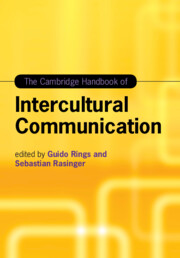Book contents
- The Cambridge Handbook of Intercultural Communication
- Cambridge Handbooks in Language and Linguistics
- The Cambridge Handbook of Intercultural Communication
- Copyright page
- Contents
- Figures
- Tables
- Contributors
- Acknowledgements
- Introduction
- Part I Introducing Intercultural Communication
- 1 What Is Culture?
- 2 What Is Intercultural Communication?
- 3 Rethinking Intercultural Competence
- 4 Interculturality or Transculturality?
- Part II Theoretical Approaches
- Part III Methods
- Part IV Application
- Part V Assessment
- Index
- References
3 - Rethinking Intercultural Competence
from Part I - Introducing Intercultural Communication
Published online by Cambridge University Press: 18 February 2020
- The Cambridge Handbook of Intercultural Communication
- Cambridge Handbooks in Language and Linguistics
- The Cambridge Handbook of Intercultural Communication
- Copyright page
- Contents
- Figures
- Tables
- Contributors
- Acknowledgements
- Introduction
- Part I Introducing Intercultural Communication
- 1 What Is Culture?
- 2 What Is Intercultural Communication?
- 3 Rethinking Intercultural Competence
- 4 Interculturality or Transculturality?
- Part II Theoretical Approaches
- Part III Methods
- Part IV Application
- Part V Assessment
- Index
- References
Summary
Jürgen Bolten explores intercultural competence as a form of general ‘action competence’, which is implemented in intercultural, i.e. uncertain contexts. In the context of increasing social mobility at nearly all levels and in most professions, intercultural competence is highlighted as more relevant today than ever before. However, that relevance correlates with a ‘rethinking’ of the concept, within which intercultural competence research has to expand its own horizons by integrating the hitherto still dominant focus on national cultural diversity into the much more complex field of micro-cultural diversity.
Keywords
- Type
- Chapter
- Information
- The Cambridge Handbook of Intercultural Communication , pp. 56 - 67Publisher: Cambridge University PressPrint publication year: 2020
References
- 11
- Cited by

